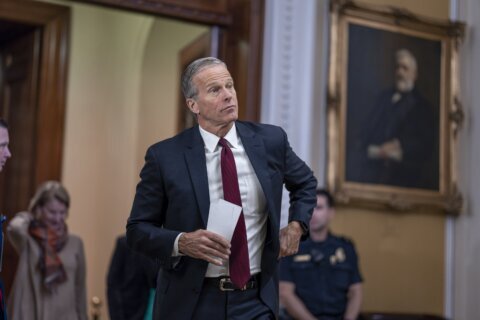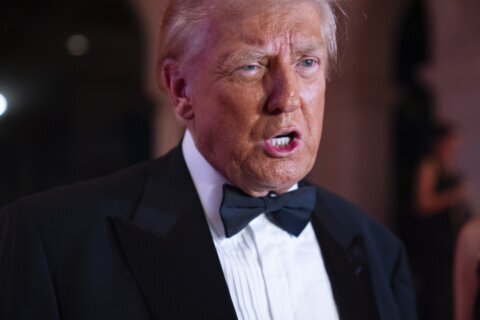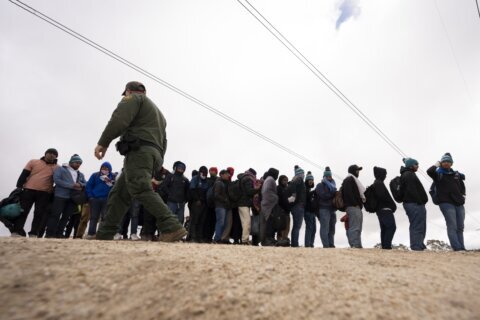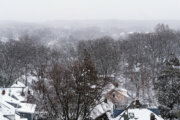BERLIN (AP) — Germany’s president on Thursday inaugurated the rebuilt tower of a church that became associated with the Nazis’ takeover of power and whose remains were demolished under communist rule.
President Frank-Walter Steinmeier said it offers an opportunity to reflect on the country’s complicated past amid a surge in authoritarian and antidemocratic attitudes.
The baroque tower of the Garrison Church, rebuilt with a viewing platform 57 meters (187 feet) above street level, rises over the center of Potsdam, just outside Berlin. Mayor Mike Schubert said it “provides a new view over the expanse of our city and also into the depths and the abysses of our history.”
On March 21, 1933, the Garrison Church, or Garnisonkirche, was the scene of the first opening of parliament after Adolf Hitler became chancellor — weeks after the fire at the Reichstag building in Berlin that was followed by the suspension of civil liberties.
Outside the church, Hitler shook hands with President Paul von Hindenburg. The scene came to symbolize the alliance of the “new” and “old” Germany, between the Nazis and conservative traditionalists.
The church was originally built in the 1730s to serve the Prussian royal court and the military. It burned out in bombing shortly before the end of World War II in 1945, and the remains of the tower were blown up under East Germany’s communist government in 1968.
Ambitions to rebuild the church — and opposition to the plans — date back to the 1990s. The partial reconstruction was eventually carried out by a foundation backed by the Protestant church.
Critics view the church as a symbol of militarism and a place the far-right could identify with. More than 100 people demonstrated opposite the tower Thursday in a protest organized by a group that has opposed the rebuilding.
Backers aim to counter the opposition with an exhibition taking a critical look at the history of the site. The words “Guide our feet into the way of peace” are inscribed into the base of the rebuilt tower in five languages.
The regional Protestant bishop, Christian Stäblein, pledged at the inauguration ceremony to ensure that “the enemies of democracy and peace … have no place here.”
Steinmeier acknowledged that the road to rebuilding the tower “was long, it was complicated and, as we can hear outside, it remains contentious.”
“This place challenges us,” he said. “It confronts us with its and with our history.”
Under the kaisers, preachers at the church “put religion into the service of nationalist propaganda, glorified war and unconditional obedience,” Steinmeier said. After the end of World War I and the monarchy, it still “attracted antidemocratic forces.”
But he said the building’s hefty historical baggage, and the debate about it, offers opportunities today.
Concern about the strength of the far right has mounted in Germany in recent months. The far-right Alternative for Germany party appears on course for strong performances in three state elections in the formerly communist east — including in Brandenburg, whose capital Potsdam is — over the next month.
“Contempt for democracy and its institutions, fascination with authoritarianism and exaggerated nationalism unfortunately are not just yesterday’s issues — they are alarmingly topical,” the president said. “The new Garrison Church can be a place where we develop an awareness for historical contexts … and critically question Prussian and German history. More than that, we can reflect on how to deal with history.”
The rebuilt tower stands alongside a communist-era data processing center, which now serves as a working place for artists. Steinmeier, who was the patron of the rebuilding project, said that center should be preserved. There are no plans to rebuild the nave of the church.
The reconstruction cost about 42 million euros ($46 million), the majority provided by the federal government, according to the foundation behind it. The tower opens to the public starting Friday.
Potsdam is home to a range of historical sites including the Sanssouci Palace and its park, and the Cecilienhof Palace where the wartime allies’ Potsdam conference was held in 1945.
Copyright © 2025 The Associated Press. All rights reserved. This material may not be published, broadcast, written or redistributed.







